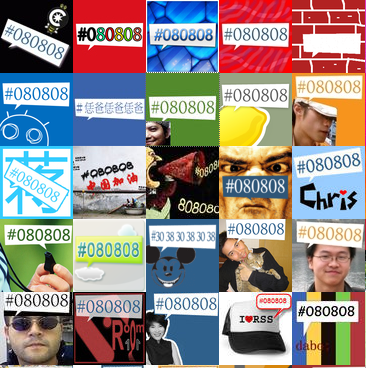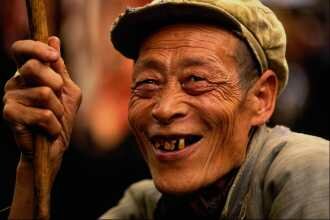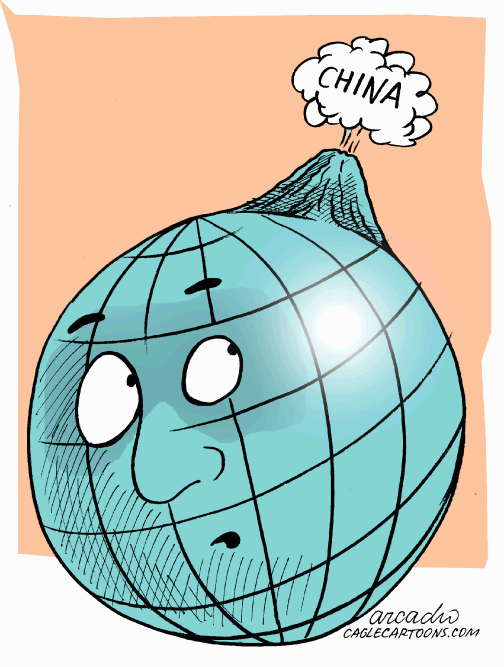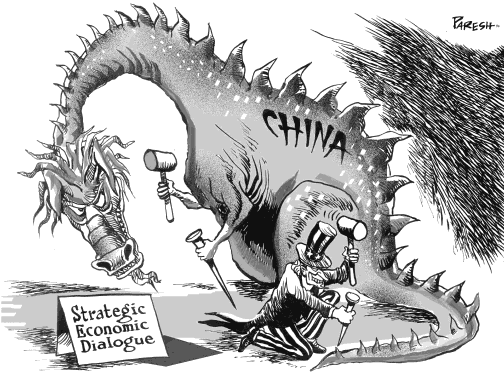I just met with several students from area colleges at my apartment. They are all volunteers at some level for various causes in China. They are an amazing group: smart, kind and honest, as my mother would have said, to a fault. They accept China on China’s terms and do their best to ethically orient themselves toward success in a society where the rules are not always as clear as we in the west would want them to be…
Today, one student innocently shared information about university sanctioned illegal video and audio downloads and another showed me study materials stolen from America’s Educational Testing Service (ETS) that were reprinted, and repackaged without identifying marks and then sold to him by New Oriental (NYSE: EDU) staff. Let me digress a bit before I explain more to you of what I learned during one of my most enlightening lessons on IP theft, Chinese Education and academic cheating….
-
Before I could become an instructor at the US Army’s Academy of Health Sciences, then one of the most modern teaching facilities in the US, I had to take a series of courses designed to make me a better educator. I was required to pass six graduate hours of training in lesson plan preparation, test item construction and item analysis. These courses were meant to insure that all classes taught by me would be measured against overt behavioral objectives. It’s intent was that students would be fairly graded and measurably educated. And for the record: there was still great creative latitude available to instructors about how to present a course, but the structure imposed on us guaranteed each student a fair chance at a good score. We also had teams of graphic artists, an enviable TV production station with closed circuit capability and virtually unlimited other resources to assist us and our personal classroom styles–one of the few positive benefits of the Vietnam draft was a wildly diverse and talented military whose skills the Army sometimes put to good use….
All of this was incredibly costly. I remember helping preparing the Army’s Behavioral Science Study Guide by authoring the Learning Theory and Behavior Modification chapters. It took thirty faculty members several months to create a comprehensive guide to social work/psychology theory and procedures that was used for years around the world as a promotions test preparation tool. I know the expense of creating quality tests and their power and validity when used correctly.
Tests are everything in China. Literally. The annual college boards here are similar to our GRE, SAT, ACT, GMAT, LSAT and numerous standardized tests. But, the main difference is: in China your future generally rests on your academic acumen as measured by one test taken on one day of your life– It is not unlike the last year’s Olympics in some ways. Socially and financially the waiting time between re-tests in China, easier in the US, can be devastating here: A single point can mean you that IF you get admitted to a Chinese “Ivy League” school,you might still be relegated to a less prestigious major that the administration will order you to study–and no, you cannot transfer easily to any other department. Can you imagine a student at Harvard being told they MUST take linguistics as a course of study?
So, many students head for cram schools to get a leg up on the competition. New Oriental, which went public 2 years ago for 100 million USD, was sued by ETS a few years ago, but continues to flaunt copyright laws in most of its centers. In 2001, Xu Xiaoping, vice-president of New Oriental, acknowledged their “mistake” in connection with the ETS copyright issue and went on to say said that his school had contacted ETS several times to buy the publishing rights for authorized GRE materials, but that they had been repeatedly rejected–Imagine that. Xu noted that New Oriental would have become the largest buyer of ETS materials in China if ETS had made authorized GRE materials available to them. So, since N.O. can’t get materials–on N.O’s terms–from ETS, they just steal them.
One student told me about professional test thieves who make a great deal of money by signing up for ETS and IELTS exams and either memorize questions (long a practice of law and insurance board schools in the US) or just replace paper tests with pre-fab fakes and then sell the originals to New Oriental’s publishing consorts. The books have no author, publisher or copyright listed, but they are sold by staff at N.O. schools. N.O. then packs 200-250 students in a cram class, hires cheap and marginally qualified teachers or $150 a month interns to preside over classes so they can pockets millions of RMB a week in profit. I am occasionally glancing at stolen test prep materials as I write. I have given it a lot of thought and ask myself: What student of any nationality, anxious to further a career, could resist getting actual exam questions and study hints for any U.S. or Commonwealth test for only $3.50 USD?
Students from middle class families live in dorms with enforced curfews and those that are lucky enough to have TV may have to share one with up to 150 classmates. Libraries are not current and most school intranets prevent access to thousands of western sites. For many students, even those in International Business, their only view of the west, prior to graduation, comes courtesy of a heavily censored CCTV or those shows and books filched from bit torrent locations. I blame part of China’s student suicide epidemic on the dearth of stimulation at many campuses and the singular dominance of exam dedicated teaching. Even during the most grueling courses at the Army’s Academy of Health Sciences we taught “toward” the test, but promoted social activities and encouraged “real life” interactions and learning beyond classroom walls.
Then, there is N.O., a multimillion dollar, “publicly held” corporation openly preying on the desperation of students hoping to break ranks and better themselves despite China’s lock-step educational boot camps and profiteering cadres. Test prep is a several billion dollar a year industry here and there is no excuse for N.O. not paying its dues to the overseas organizations that are investing huge amounts of money in research, development and ongoing statistical analysis to level the academic playing field for foreigners and native learners alike. Cram schools are cheating ETS and others of profits and displacing deserving students who have studied according to the rules.
Research has long borne out the fact that such a model of learning: a punitive and obsessive approach to winning at any cost, creates only aberrant behavior. When we unnaturally force youth to adopt our national or political aspirations we should count the loss of their ability to enjoy normal developmental stages, once known as childhood, as a death and one as as final and unnatural as the corporeal loss of a son or daughter.
I was leaving a lecture last year when I heard what I thought was a rehearsal for a drama contest: a native English speaking teacher, one of the retinue of a British educational group preparing students for study abroad, was shrieking at a student some 100 meters away. Through the dementia I heard the words, “Test”, “Late” and Stupid” several times; then a door slammed shut in a violent rebuke of all I have ever held dear in teaching. A once reputable organization that recruited students for UK schools has lowered admission standards for high-paying International students and is a money making machine that pours cash from unprepared rich kids into British schools and leaves recruiters, students and weary teachers wealthier, albeit worse for the experience. And the teachers, worn frail by students feeling they are nothing more than a paycheck for schools/teachers keep a wheel of frustration turning.
Later in the same day one of my favorite students, a senior at one of China’s top schools, phoned me. After a long silence in which I am sure he was trying to properly conjugate his emotions he whispered that he had done poorly on his Graduate Record Exam and that everything he had trained for, all the lost days of adolescence spent in test preparation, had been incarcerated in a single test score. This is the same young man who told me about well-known teachers here in China who will sell a letter of recommendation and who showed me materials handed out by “tutors” at New Oriental the publicly held cram school that pays students to sign up for and then steal US and British standardized exams and republishes and sells the questions. Many of these “learners” are those being pushed by parents to spend graduate school abroad in, what is for the student, one of hell’s circles for the duration of a degree in a field they well may loathe.
The video below amused many, but now me and is a sad example of what teaching in the cram schools can devolve into when educational carpetbaggers from the US, UK and China prey on a one-child family’s aspirations by industrializing and monetizing their dreams:
“Test-prep classes at the New Oriental School can drag on for a long, long time. To spice things up a bit, teachers were encouraged to do wake-up performances. Things started mildly enough—joke telling, maybe a rousing song—but now, we have this rather risqué dance routine, performed by a TOEFL teacher at one of New Oriental”s Beijing campuses.” (HT to Kaiser Kuo)
Yesterday, one of my students from the past, an ebullient, artistic and wonderfully complicated young woman, emailed me for a recommendation to college in America. She has been a dutiful student at a Chinese “Ivy League” school, in a major chosen for her by the administration, only to answer the callings of a typically demanding academic mother and father. There was an uncharacteristically uncombed sound to her words, clues I may not have been meant to follow, but I did anyway. One of the gentlest spirits I have ever know and really a favorite student leaped into an uncertain eternity last year because school authorities in Macau stifled her cries for help, so I am not about to let even the most obscure hints of trouble go unchallenged.
This year twice as many “sea turtles” or Chinese student/expat returnees will fold up their foreign aspirations and come back to China in search of work because plans in light of a the west’s scuttled economy. Those that wash ashore, having been socially or financially promoted to a degree abroad, are known to their peers as “sea weed.” And their paper-bound skills, might be mistaken as useful by businesses desperate for middle managers that can help them fight this financial tsunami with newly forged swords of knowledge.
Schools like Macau University of Science and Technology, degree mills, with 2+2 and 3+1 programs ( do 2 or 3 years in China/Macau and then finish in the US or UK) have arrangements with institutions like Seton Hall and Central and Eastern Michigan in the U.S. have nothing to lose save their reputations by pocketing the money ill-prepared students pay them for what should be an honorary, not earned diploma. Many 2+2 programs are reputable and provide students an incredible international experience, but Chinese students need to be guided by career counselors not paid by the schools. They should seek out those who charge operating fees that ensure the student gets in the best school-one that matches the student’s needs.
It is time for some real prep’ schools for authentic scholars who will benefit a world economy and not a few wealthy opportunists.
Addendum: The students mentioned above and others who came to me for guidance, which I gave freely, are now happily tudying abroad at schools they are happy about: Arizona, Columbia, Rutgers, University of Nebraska, CUHK, Carnegie Mellon, UCLA Berkeley and others….
Note: This is one of the reasons IELTS China was started. Read more about it here (in Chinese): IELTS GUANGZHOU
Asia,
Beijing,
China Business,
China Economics,
China Editorials,
China Expat,
China Expats,
China Resources,
Chinese Education,
Education in China,
Executive Training China,
Expats,
Guangzhou,
Guangzhou China,
Intercultural Issues,
Macau,
Macau University of Science and Technology,
New Oriental,
Teaching in China,
UK,
中国人口福利基金会,
中文,
澳门科技大学















